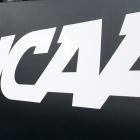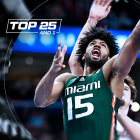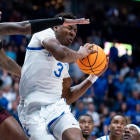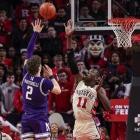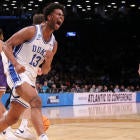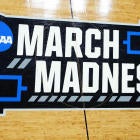The NCAA Division I Council took a step toward eventually allowing one-time transfers immediate eligibility in basketball, football, baseball and hockey on Wednesday by approving a measure that calls for the development of new transfer legislation. However, any new rules governing what would be a landmark change to NCAA protocol won't go into effect this year, meaning transferring players in those sports will still need waivers if they are going to be eligible in the 2020-21 academic year.
"The transfer environment has long been an issue of much discussion in Division I. The Division I Council is committed to a uniform and equitable approach to transfer rules that considers student-athlete well- being and the opportunities available after transfer," said Council chair M. Grace Calhoun, athletics director at Pennsylvania in a statement. "We will not simply change the rule, but we will consider a comprehensive package designed to address the multiple complexities involved."
The council's decision to delay implementing a rules change allowing all one-time transfers immediate eligibility was the expected outcome after the NCAA Board of Directors recommended last month against changes to the transfer-waiver process "at this time." The development of the new legislation is expected to be a complicated and time-consuming effort at a time when athletic departments are already stretched thin as the COVID-19 crisis continues.
While Wednesday's vote may have been the expected outcome, it will almost certainly bring a fallout for college basketball programs, in particular. Kentucky, for example, secured a commitment from Wake Forest transfer Olivier Sarr earlier this month. If eligible, the 7-footer projects to be the Wildcats' starting center in the 2020-21 season.
However, Sarr told ESPN "there's no way" that he would sit out a season. Wednesday's decision by the Division I Council means Sarr will now have to secure a waiver if he's going to be eligible next season; without a waiver, the Wildcats risk losing him to the professional ranks.
Other programs, such as Memphis and Michigan, each landed multiple transfers after both saw high-profile recruiting targets opt to sign with the G League's new program for elite prospects. But Wednesday's vote means those players, like Sarr, would have to receive a waiver for immediate eligibility if they are going to help their teams next season.












